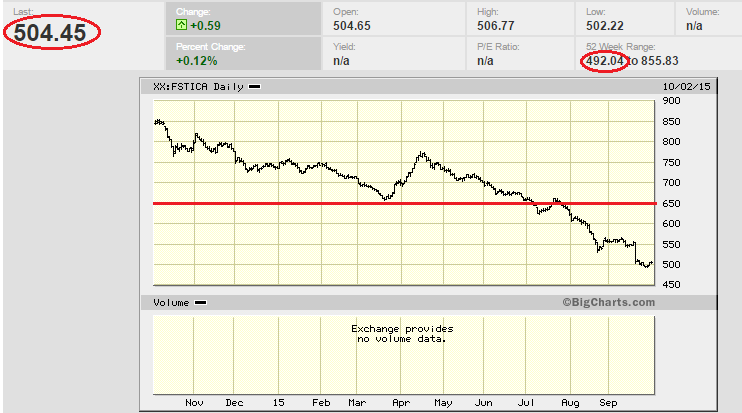|
|
Post by zuolun on Aug 8, 2015 8:36:06 GMT 7
hyom, CFD share trading is best for short-trades. If used correctly, its primary purpose is to hedge against existing long-trades purchased in the cash account. Majority of frequent CFD traders in Singapore ignore the high risk and cost in leverage by buying stocks heavily without any hedging. If the market suddenly collapses 10% to 30%, even the most experienced / professional margin traders who borrow heavily from the CFD brokers will get wipe out, instantly. The Chinese retail investors in the PRC recently learned their first lesson on high leverage / margin trading, the hard way.  China stocks trader counts his losses: 'Never trust the government' China stocks trader counts his losses: 'Never trust the government' ~ 2 Aug 2015 Chinese farmer invested life savings in stocks, lost it all ~ 28 July 2015 IG clients who got wiped out describe their 10 minutes of hell during the Swiss franc currency explosion ~ 30 Apr 2015 Hi Zuolun, Thanks for the info. Being always on the lookout to lower my cost, I have considered using CFDs. A few months ago, I thought of using CFDs to invest in London stocks to avoid the exorbitant 0.5% stamp fee. I made some enquiries to my broker, Interactive Brokers (IBKR), which offer access to international stock markets. I hate leverage because it complicates risk management, so I asked if I can pay in full when buying CFD. The answer was no. Leverage is forced upon the investor who uses CFD. The bad thing is that leverage comes with financing charges. So, for someone who intend to hold a position over a longer-term period, CFD is not viable. Besides, why should I pay interest for a loan that I don't want in the first place? Furthermore, for CFD operators who use the market-making model, I am always suspicious whether the CFD operator would withdraw liquidity just when I needed it to sell to cut risk. By the way, for foreigners who want a cheap broker to invest in SGX market, IBKR provides very low commission. www.interactivebrokers.com/en/?f=commission&p=stocks2#asia-pacificThis broker was used by the foreign stock operators who manipulated Blumont. Singaporeans cannot use IBKR to invest in the Singapore market. Not sure why. Protectionism? If Singaporeans were allowed to buy Singapore stocks through IBKR, not only will our local brokers lose their lunch break, they will also have to switch to eating grass for lunch. As a customer who have used multiple local and foreign brokers, it is pretty obvious the U.S brokers win hands down with their platform. I hope our local brokers would buck up and do some self-reflection and take decisive action.
|
|
|
|
Post by roberto on Aug 8, 2015 23:14:43 GMT 7
There's a saying that goes: good people learn from their mistakes, the best people learn also from the mistakes of others. It's very sad to read of such cases, but investing, after all, has always been very experience based. |
|
|
|
Post by roberto on Aug 9, 2015 0:07:23 GMT 7
Hi Zuolun, Thanks for the info. Being always on the lookout to lower my cost, I have considered using CFDs. A few months ago, I thought of using CFDs to invest in London stocks to avoid the exorbitant 0.5% stamp fee. I made some enquiries to my broker, Interactive Brokers (IBKR), which offer access to international stock markets. I hate leverage because it complicates risk management, so I asked if I can pay in full when buying CFD. The answer was no. Leverage is forced upon the investor who uses CFD. The bad thing is that leverage comes with financing charges. So, for someone who intend to hold a position over a longer-term period, CFD is not viable. Besides, why should I pay interest for a loan that I don't want in the first place? Furthermore, for CFD operators who use the market-making model, I am always suspicious whether the CFD operator would withdraw liquidity just when I needed it to sell to cut risk. By the way, for foreigners who want a cheap broker to invest in SGX market, IBKR provides very low commission. www.interactivebrokers.com/en/?f=commission&p=stocks2#asia-pacificThis broker was used by the foreign stock operators who manipulated Blumont. Singaporeans cannot use IBKR to invest in the Singapore market. Not sure why. Protectionism? If Singaporeans were allowed to buy Singapore stocks through IBKR, not only will our local brokers lose their lunch break, they will also have to switch to eating grass for lunch. As a customer who have used multiple local and foreign brokers, it is pretty obvious the U.S brokers win hands down with their platform. I hope our local brokers would buck up and do some self-reflection and take decisive action. I'm generally not familiar with broker details as I only mainly use DBSV and POEMS, but are the foreign brokers you speak of regulated by MAS? I had an experience with City Index before and I only opened an account because I was informed they were MAS regulated and the kept clients' money in a separate account, so in the case of shock events (e.g. Swiss Franc incident), clients' capital will be intact. City Index is still a market maker, and that does come with some risks and costs. It was not because I was unhappy that I closed my account, but if I'm buying with a time frame of years, I feel much safer with straightforward direct purchase and having them in my CDP. |
|
|
|
Post by zuolun on Aug 9, 2015 5:50:19 GMT 7
There's a saying that goes: good people learn from their mistakes, the best people learn also from the mistakes of others. It's very sad to read of such cases, but investing, after all, has always been very experience based. There's another version: "The smart man learns from his mistakes, the wise man learns from the mistakes of others but the stupid man never learns." — Stupidity can make one man smiles and another man cries. |
|
|
|
Post by hyom on Aug 9, 2015 8:15:40 GMT 7
I use Interactive Brokers(IBKR) to invest in stocks in Hong Kong and U.S given the recent discouraging developments in the Singapore stock market scene. IBKR is regulated by the respective monetary authorities in these stock markets. I didn't bother to find out whether IBKR is regulated by MAS because Singaporeans like me are forbidden to trade Singapore stocks through IBKR anyway. Given that stocks is a highly regulated asset class compared to CFDs and Forex, I think all stock brokers in Singapore should have a license. Not sure about CFDs and Forex. Hi Zuolun, Thanks for the info. Being always on the lookout to lower my cost, I have considered using CFDs. A few months ago, I thought of using CFDs to invest in London stocks to avoid the exorbitant 0.5% stamp fee. I made some enquiries to my broker, Interactive Brokers (IBKR), which offer access to international stock markets. I hate leverage because it complicates risk management, so I asked if I can pay in full when buying CFD. The answer was no. Leverage is forced upon the investor who uses CFD. The bad thing is that leverage comes with financing charges. So, for someone who intend to hold a position over a longer-term period, CFD is not viable. Besides, why should I pay interest for a loan that I don't want in the first place? Furthermore, for CFD operators who use the market-making model, I am always suspicious whether the CFD operator would withdraw liquidity just when I needed it to sell to cut risk. By the way, for foreigners who want a cheap broker to invest in SGX market, IBKR provides very low commission. www.interactivebrokers.com/en/?f=commission&p=stocks2#asia-pacificThis broker was used by the foreign stock operators who manipulated Blumont. Singaporeans cannot use IBKR to invest in the Singapore market. Not sure why. Protectionism? If Singaporeans were allowed to buy Singapore stocks through IBKR, not only will our local brokers lose their lunch break, they will also have to switch to eating grass for lunch. As a customer who have used multiple local and foreign brokers, it is pretty obvious the U.S brokers win hands down with their platform. I hope our local brokers would buck up and do some self-reflection and take decisive action. I'm generally not familiar with broker details as I only mainly use DBSV and POEMS, but are the foreign brokers you speak of regulated by MAS? I had an experience with City Index before and I only opened an account because I was informed they were MAS regulated and the kept clients' money in a separate account, so in the case of shock events (e.g. Swiss Franc incident), clients' capital will be intact. City Index is still a market maker, and that does come with some risks and costs. It was not because I was unhappy that I closed my account, but if I'm buying with a time frame of years, I feel much safer with straightforward direct purchase and having them in my CDP. |
|
|
|
Post by roberto on Aug 9, 2015 19:56:00 GMT 7
There's a saying that goes: good people learn from their mistakes, the best people learn also from the mistakes of others. It's very sad to read of such cases, but investing, after all, has always been very experience based. There's another version: "The smart man learns from his mistakes, the wise man learns from the mistakes of others but the stupid man never learns." — Stupidity can make one man smiles and another man cries. Haha yours is the mean version, but doesn't make it untrue. |
|
|
|
Post by zuolun on Oct 2, 2015 22:11:52 GMT 7
In technical analysis, a stock that has made a new low is a decisive signal to short, not long. Catalist Index closed at 504.45 (+0.59, +0.12%) on 2 Oct 2015.  
|
|
|
|
Post by zuolun on Dec 21, 2015 19:41:13 GMT 7
Only mainboard listed stocks are governed by the MTP of 20cts. Catalist stocks are exempted. When I was in the SGX securities committee, I suggested that all watchlist stocks (which have to be mainboard listed) should be given the opportunity to switch over to catalist stocks. The brokers there disagreed. The brokers also wanted to reduce the lot price from 0.5cts to 0.1ct and I was the only one who disagreed. But I am one voice and sure enough, I was not invited back after my 2 year term. I think it is unfair to solely blame the management of SGX for what has happened to our penny stock market, as the brokers are as responsible. ~ 18 Dec 2015 SGX rejects Ley Choon Group Holdings’ proposed transfer to CatalistBy Amy Tan December 18, 2015 Singapore Exchange has rejected Ley Choon Group Holdings’ application for a proposed transfer of listing from the Mainboard to Catalist. The infrastructure service provider says it will not be undertaking the proposed transfer at this time. It will look into the options available to it with regard to complying with the minimum trading price requirement imposed on Mainboard-listed companies. Shares in Ley Choon closed flat at four cents. |
|

 Hi Zuolun,
Hi Zuolun,



